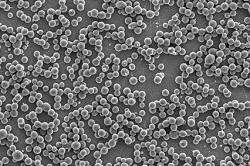 |
| Microspheres made from a biodegradable polymer--Courtesy of Penn State |
Researchers at Penn State University have developed microcapsules to deliver brain cancer drugs in a targeted and controlled way--and the consistently uniform particles would be easy to manufacture, they say.
The cancer drug BCNU is traditionally released from an implant placed within the brain, but this treatment is less than ideal due to its invasiveness and the short half-life of the drug, which breaks down in minutes, according to a university report.
And so the researchers encapsulated BCNU in biodegradable polymer microspheres that can be highly controlled in terms of shape and size, as well as for their ability to release the drug. Furthermore, there's no surgery required--the drug-loaded particles can be injected directly into the brain.
The scientists used "electrojetting"--a technique by which the drug is rapidly ejected along with an evaporating solvent--to load the capsules and determine their size and shape. The polymer material they used in the process is poly(lactic-co-glycolic) acid, which is approved by the FDA for such a purpose. And the amount of the polymer they used gave them the ability to control how their microspheres came out: a small amount gave them flattened microspheres, a little more produced microspheres and microfibers, more gave them beaded microfibers, and anything above 8% by weight gave them fibers, according to the study published in the journal Advanced Materials.
"Electrojetting is a low cost, versatile approach," said team leader Mohammad Reza Abidian. "We can produce drug-loaded micro/nano-spheres and fibers with same size, high drug-loading capacity and high drug-encapsulation efficiency."
- here's the Penn State report